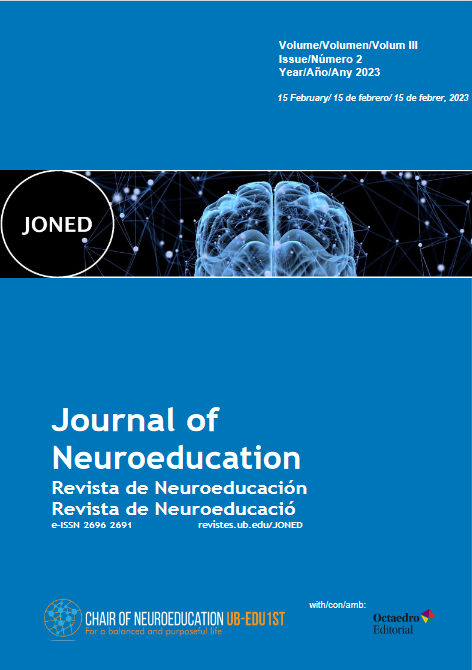El metaverso en parámetros educativos
Una reflexión ética
DOI:
https://doi.org/10.1344/joned.v3i2.40776Paraules clau:
neuroeducació, justícia, ètica, realitat virtual, ensenyament-aprenentatge, metaversResum
El propòsit d'este treball és fer una anàlisi aproximativa al metavers com a possible ferramenta educativa. Aquest anàlisi es realitzarà a partir dels principis de la neuroeducació i des de la filosofia moral, entenent la finalitat de l'educació com un bé social a protegir.
Amb l'objectiu de complir amb este propòsit la primera part del treball aborda la qüestió de què és el metavers i quins són les seues principals característiques.
El segon apartat arreplega allò que pot oferir el metavers a l'educació, com ara entorns inmersius virtuals que puguen ser explorats amb dispositius hàptics i amb ulleres de realitat virtual, així com també arreplega les dades que sustenten la idea que el metavers, com a ferramenta educativa, serà ben acollida per la població en general. Per a això s'ha fet una revisió dels hàbits d'ús de les tecnologies digitals i de les xarxes socials i altres aplicacions que ja es desenvolupen en el metavers, com ara Roblox.
En el tercer apartat s'analitza la consistència del metavers amb els principis de l'educació. Per a això s'ha fet una selecció d'alguns dels principis neuroeducatius que guarden una relació més estreta amb la metodologia proposada per a treballar en entorns inmersius.
Per a finalizar, la discussió es situa al voltant de dos eixos: el primer eix són els problemes tangibles del metavers, fonamentalment pel que fa als límits tecnològics i de disposició de talent, el segon eix se centra en la reflexió ètica des del marc neuroeducatiu.
Algunes de les conclusions a què s'arriba en aquest treball són: que la presencialitat no pot ser substituïda, s'ha de vetllar des de les institucions públiques pel desenvolupament adequat dels entorns educatius virtuals i, el metavers no pot obrir una bretxa entre la població amb més recursos i la que disposi de menys recursos.
Descàrregues
Publicades
Número
Secció
Llicència
Drets d'autor (c) 2023 María José Codina Felip

Aquesta obra està sota una llicència internacional Creative Commons Reconeixement-NoComercial 4.0.
Els autors que publiquen en aquesta revista accepten els següents termes:
a. Els autors conserven els drets d’autor i d’organisme a la revista el dret de la primera publicació
b. Els textos que es publicaran sota una Llicència d'Atribució No Comercial Creative Commons permeten altres activitats del treball, sempre que inclogui un reconeixement de l’autorització del treball, la seva actualització inicial en aquesta revista i els termes de la llicència, i no se'n faci un ús comercial.



